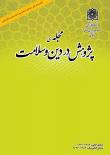مقارنة الذكاء المعنويّ ومفهوم الذات للتلميذات المكفوفات البصر والبصيرات فی المدارس الثانويّة للمرحلة الثانية بطهران
مجلة البحث في الدین و الصحه,
مجلد 3 عدد 1 (2017),
8 January 2018
,
الصفحة 52-42
الملخص
لتحميل النسخة الكاملة لهذه المقالة انقر هنا
السابقة و الأهداف: من حیث أنّ الذكاء المعنويّ ومفهوم الذات یستطيعان أن يؤثّرا على نموّ التلاميذ من جميع النواحي، ففي هذا البحث تمّت المقارنة على الذكاء المعنويّ ومفهوم الذات للتلميذات المكفوفات البصر والبصيرات فی المدارس الثانويّة للمرحلة الثانية بطهران في السنة الدراسيّة 1395-1394هـ.ش.
الموادّ و الأساليب: تمّ هذا البحث في النوع العلّی والمقارنيّ. يشتمل العدد الإحصائيّ على كلّ التلميذات المكفوفات البصر والبصيرات فی المدارس الثانويّة للمرحلة الثانية بطهران في السنة الدراسيّة 1395-1394هـ.ش. من حیث أنّ عدد التلميذات المكفوفات البصر كان 50 شخصًا، تمّ اختيار كلّ التلميذات للدراسة من أجل انخفاض حجم هذا القسم المقصود، وتمّ أيضًا اختيار 50 تلميذة من البصيرات للبحث. يُطلَق لهؤلاء التلميذات المنتخبات (المكفوفات البصر والبصيرات) في هذا البحث، العيّنات. كانت طريقة أخذ العيّنات في هذا البحث، بشكل أخذ العينات المتاح. قد استفيد لتقييم الذكاء المعنويّ من استمارة الذكاء المعنويّ لعليّ بدیع وزميلاته (1389هـ.ش) (SI)، ولتقييم مفهوم الذات من استمارة مفهوم الذات لراجرز (1951م) (SCQ). وتمّ تحليل المعطيات بطريقة الإحصاء الوصفيّ، وفي القسم الاستدلاليّ بطريقة اختبار تحليل أنوفا. هذا البحث مشتمل علی جمیع الجوانب الأخلاقیّة المرتبطة.
المكشوفات: بناءً على النتائج الحاصلة، كان بین الذكاء المعنويّ للتلميذات المكفوفات البصر والبصيرات فرق ذومعنى (P<0.05). كان الذكاء المعنويّ للتلميذات المكفوفات البصر، بشكل ذي معنى، أكثر من نظيراتهنّ البصيرات؛ لكن لم يكن الفرق حول مفهوم الذات لهذين الفريقين ذامعنى.
النتیجة: تكشف نتائج البحث أنّ إدراك و رؤية التلميذات المكفوفات البصر بالنسبة إلى قدراتهنّ في درجة عالية، ومتساويان مع نظيراتهنّ البصيرات.
لتحميل النسخة الكاملة لهذه المقالة انقر هنا
يتم استناد المقالة على الترتيب التالي:
Semnanian S, khodabakhshi koolaee A. The Comparison of the Spiritual Intelligence and Self-Concept of Blinds and Sighted High School Girl Students in Tehran J Res Relig Health.2017;3(1): 42- 52
- التلميذات
- الذكاء المعنويّ
- المكفوفة
- مفهوم الذات
كيفية الاقتباس
المراجع
Rezazadeh H. The Investigation and Comparison of Adjustment Mothers of Special Children and Normative Sample. Tehran,Iran: The Faculty of Psychology and Education of Allameh Tabatabaii University; 2008.(Full Text in Persian)
Sarabandi A, Kamali M, Mobaraki H. The Relationship between Impaired Visual Function and Quality of Life of the Blind. Journal of Research in Rehabilitation. 2013; 8(6):10-5.(Full Text in Persian)
Sadeghpoor N. Familiarity to Vision Rehabilitation Process. Journal of Rehabilitation. 2006;7(3):62-5.(Full Text in Persian)
Warren DH. Blindness and early childhood development U.S.A: American foundation for the Blind Blindness and early childhood developmen; 1997. (Full Text in Persian)
Mishra P, Vashist K. A review study of spiritual intelligence, stress and well-being of adolescents in 21st century. International Journal of Research in Applied Natural and Social Sciences. 2014;2(4):11-24.
Halder S, Datta P. Insights into Self-Concept of the Adolescents Who Are Visually Impaired in India. International Journal of Special Education. 2012; 27(2): 86-93.
Amram Y. The seven dimensions of spiritual intelligence: An Ecumenical, Grounded Theory. 115th Annual Conference of the American Psychological Association; San Francisco2007.
Gardner H. A case against spiritual intelligence. The international journal for the psychology of religion. 2000;10(1):27-34.
Noble K. Spiritual intelligence: A new frame of mind. Advanced Development. 2000;9:1-29.
Emmons RA. Is spirituality an intelligence? Motivation, cognition, and the psychology of ultimate concern. The International Journal for the psychology of Religion. 2000;10(1):3-26.
Sisk DA, Torrance EP. Spiritual intelligence: Developing higher consciousness: Creative Education Foundation Press; 2001.
Nasel D. Spiritual Orientation in Relation to Spiritual Intelligence a Consideration of Traditional Christianity and New Ageindividualistic Spirituality 2004.
King DB. Rethinking claims of spiritual intelligence:A definition, model, and measure: ProQuest; 2008.
Zohar D, Marshall I, Marshall I. SQ: Connecting with our spiritual intelligence: Bloomsbury Publishing USA; 2000.
Vaughan F. What is spiritual intelligence? Journal of humanistic psychology. 2002;42(2):16-33.
Lotfi M, Sayyari S. The Relationship Between Spiritual Intelligence and Psychological Health in over 15 People in Behshahr. Behshahr,Iran: Payam Noor University; 2008.(Full Text in Persian)
Epstein S. The self-concept revisited: Or a theory of a theory. American psychologist. 1973;28(5):404.
Sappington AA. Adjustment: Theory, research, and personal applications: Brooks/Cole Pub Co; 1989.
Mattson JL, Ollendick T. Translator: Behpazhooh. Enhancing Children’s Social Skills: Assessment and Training. Tehran: Ettelaat Publication; 1988. (Full Text in Persian)
Mahmoodi A. A Comparison Between Self-Esteem and Social Skills in Deaf and Blind Secondary Students of Karaj. Journal of Exceptional Education. 2013; 13(117): 20-9.(Full Text in Persian)
Badee' A, Savaari E, Bagheri Dasht Bozorg N, Latifi V. Construction and Validity Finding of Spiritual Intelligence Inventory. The First National Psychology Conference in Payam Noor university of Tabriz; Tabriz;2010.(Full Text in Persian)
Keihani M. The Role of Computer Games on Changing the Level of Self-Concept and Behavioral Dysfunction in Primary Students of Neyriz City. Marvdasht, Iran: The Faculty of Education and Psychology. Marvdasht Azad University; 2010. (Full Text in Persian)
Corey G. Theory and practice of counseling and psychotherapy: Nelson Education; 2015.
Khodabakhshi-koolaee A, Esmaeilifar A, Falsafinejad MR. Comparison of life meaning and hopefulness between spinal cord injuries, blinds, and healthy people in Kerman-Iran. IJRN. 2015; 1(3): 54-64. (Full Text in Persian)
Maleki-Tabar A, Khoshkonesh A, Khodabakhshi-Koolaee A. Comparing the self- concept and social adjustment among blind and healthy male student. Zahedan J Res Med Sci (ZJRMS). 2012; 13(1): 33. (Full Text in Persian)
Ghomrani A, Noori, Sh. The comparison of self-concept and its elements between blind and unblind students. Journal of exceptional education. 2005; 45: 2-6. (Full Text in Persian)
Fischer JA, Sousa-Poza A. Does job satisfaction improve the health of workers? New evidence using panel data and objective measures of health. 2008.
Garaigordobil M, Bernarás E. Self-concept, self-esteem, personality traits and psychopathological symptoms in adolescents with and without visual impairment. The Spanish journal of psychology. 2009; 12(01): 149-60.
- الملخص المشاهدات: 274 الأوقات
